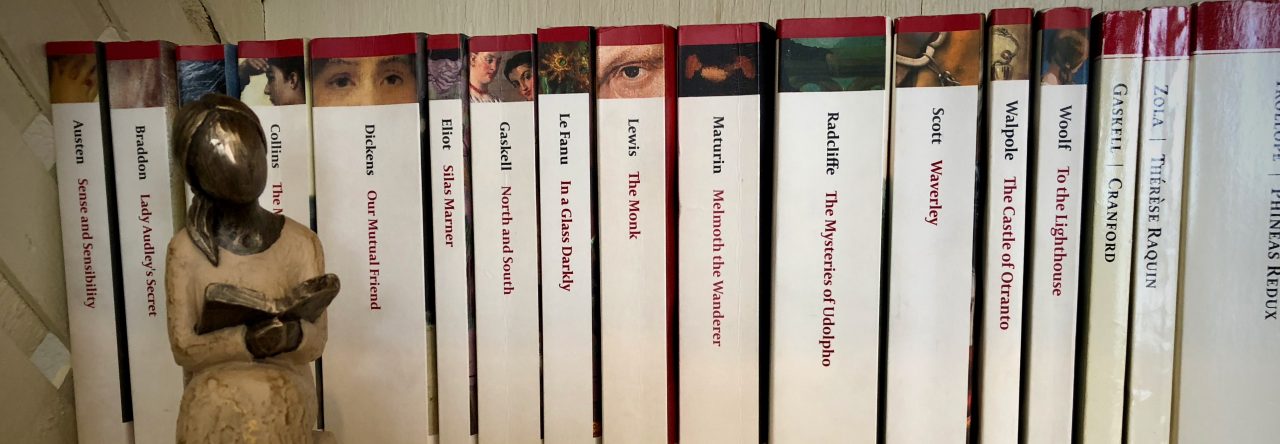Hello everyone! March was a crazy month, and even though I read a bunch of books, I didn’t do quite so well on my reading challenge. That’s okay. I’ll double up in the summer or something.
Here are some of the books I did finish:
Classic: Wise Blood by Flannery O’Connor
 Hazel Motes is vehemently against religion, so much so that he founds the Church without Christ and starts preaching on the streets. In doing so, Hazel comes into contact with Enoch Emery, a strange and lonely young man with a mystical outlook, and sham preacher Asa Hawks and his daughter Lily Sabbath. The four characters and their four different perspectives on the world and meaning get tangled up together in O’Connor’s typically jarring and grotesque way.
Hazel Motes is vehemently against religion, so much so that he founds the Church without Christ and starts preaching on the streets. In doing so, Hazel comes into contact with Enoch Emery, a strange and lonely young man with a mystical outlook, and sham preacher Asa Hawks and his daughter Lily Sabbath. The four characters and their four different perspectives on the world and meaning get tangled up together in O’Connor’s typically jarring and grotesque way.
I sort of liked this book. O’Connor’s work always requires me to engage in some deep and lengthy thinking before I can reconcile myself to them. Wise Blood is really about how you cannot escape Christ, no matter how hard you try. The characters are outlandish and ridiculous, as is typical of O’Connor, and the book leaves you feeling jarred and unsettled, which is exactly what she wants. This is my first O’Connor novel, and also her first novel, and I definitely felt that it wasn’t as well done as some of her later short stories. I would be interested to read another novel, to see if the flaw is the form or the timing.
Literary Fiction Contemporary: Station Eleven by Emily St. John Mandel
 While I was initially wary of this book–I cared for the main character and the Traveling Symphony and didn’t know if this was going to be a violent book–I ended up loving it. Spoiler: it’s not violent. (phew!).
While I was initially wary of this book–I cared for the main character and the Traveling Symphony and didn’t know if this was going to be a violent book–I ended up loving it. Spoiler: it’s not violent. (phew!).
Arthur Leander, a famous actor, dies of a heart attack while onstage performing King Lear. It turns out that that’s the beginning of the end of the world, as a virulent flu spreads quickly and decimates everywhere. The book also follows Kristen Raymonde who, as a young girl, was in that fateful performance of King Lear and now lives and works with the Traveling Symphony, a theater and orchestra troupe which travels to the new settlements in this post-apocalyptic reality to bring some culture and fun to the people. On a routine stop in a town called St. Deborah on the Water, the troupe finds that the town has recently been taken over by the Prophet and his followers, a cult that has a firm grip on the town. It was this part which concerned me, but the novel actually spends only a little time with the Prophet. It jumps back and forth through time, looking at the life of Arthur, his friend, and his first wife, and forward to Kristen’s life.
I loved this book, by the end. All of the characters were very interesting, and part of the fun of the story was wondering how it would all come together in the end. As you start to see the pieces connect, it turns into a lovely contemplation of the inevitable interconnectedness of people, and a celebration of community.
I planned to read Othello, but didn’t quite get there.
Three other books I read and loved:
Furthermore by Tahereh Mafi.
 This is a middle grade fantasy about Alice, a girl who is born into a world where color is the most important thing. But, except for her eyes, Alice is completely colorless. When the story opens, Alice’s father has been missing for three years, and together with Oliver, a boy from her town, she travels to another magical region called Furthermore to try to find him.
This is a middle grade fantasy about Alice, a girl who is born into a world where color is the most important thing. But, except for her eyes, Alice is completely colorless. When the story opens, Alice’s father has been missing for three years, and together with Oliver, a boy from her town, she travels to another magical region called Furthermore to try to find him.
This story was just so deeply charming. The narrator has a strong voice, and lots of comments and asides about the characters and events. Alice and Oliver were lovely and flawed characters who had to learn to work together and master their weaknesses to succeed in their quest. And the writing was lyrical and lovely. I read this book at the beginning of the month, and I’m still thinking about it.
How to Stop Time by Matt Haig
 Tom Hazard was born in the 1500s. He has a disease that causes him to age incredibly slowly, meaning that he may be 400, but he only looks 40. In the present day, he is helped by the Albatross Society, an organization which finds and protects people like him. The Society’s biggest rule is to not fall in love, but when Tom moves back to London after centuries away, and begins to teach history at a high school, he finds himself attracted to the lovely French teacher. These three events – the move, teaching history, falling in love – lead Tom to reflect on his past life experiences, some truly tragic, others beautiful, and reconsider the necessity of the Albatross Society. But the society doesn’t want to let him go . . .
Tom Hazard was born in the 1500s. He has a disease that causes him to age incredibly slowly, meaning that he may be 400, but he only looks 40. In the present day, he is helped by the Albatross Society, an organization which finds and protects people like him. The Society’s biggest rule is to not fall in love, but when Tom moves back to London after centuries away, and begins to teach history at a high school, he finds himself attracted to the lovely French teacher. These three events – the move, teaching history, falling in love – lead Tom to reflect on his past life experiences, some truly tragic, others beautiful, and reconsider the necessity of the Albatross Society. But the society doesn’t want to let him go . . .
This book, too, jumps back and forth through time. I really enjoy books like that, actually. One of my favorite books ever is The Night Circus, which uses that narrative technique. I don’t know it How to Stop Time will become a top-list favorite, but I really enjoyed it. The book is more thoughtful than the dust-jacket description makes it sound, although there are plenty of happenings. In the end, it’s focused on Tom’s journey to make sense of his long life so far, and his learning How to Stop Time. I did feel like the ending was a bit rushed, but otherwise, a great book.
Strange the Dreamer by Laini Taylor
 In this fantasy world, there is a city that no-one has ever been allowed to visit, from which impossible marvels have emanated, until they abruptly ceased two hundred years ago. And when Lazlo Strange is a boy, the name of this city suddenly disappears from the world. Nobody can remember it’s original name, so they call it Weep. Lazlo, an orphan boy raised by monks, later becomes an apprentice librarian with a deep fascination of Weep. Then, one day, an emissary arrives from Weep, the first anyone has heard of the city in two hundred years. Because of his deep knowledge of the city, Lazlo joins a delegation collected by the Godslayer to perform a mysterious task. To say any more would be spoilers.
In this fantasy world, there is a city that no-one has ever been allowed to visit, from which impossible marvels have emanated, until they abruptly ceased two hundred years ago. And when Lazlo Strange is a boy, the name of this city suddenly disappears from the world. Nobody can remember it’s original name, so they call it Weep. Lazlo, an orphan boy raised by monks, later becomes an apprentice librarian with a deep fascination of Weep. Then, one day, an emissary arrives from Weep, the first anyone has heard of the city in two hundred years. Because of his deep knowledge of the city, Lazlo joins a delegation collected by the Godslayer to perform a mysterious task. To say any more would be spoilers.
Oh, my, this book is magic. The fantasy world is rich and detailed, the plot fascinating, Lazlo darling. I love that he’s an awkward, unattractive nerd with a heart of gold. The mystery surrounding Weep slowly unravels, and as it does, the book’s themes of hate and love, bitterness and forgiveness, blindness and understanding also unravel. It’s a rare YA fantasy that is not just a good story, but a meaningful one, and Strange the Dreamer is certainly that. This IS on my short-list favorites, and I can’t wait for the sequel (Muse of Nightmares), which comes out in October, I think.
So! Those were some of the books I read in March. How was your reading month?

 “Therefore if my book wins general favor, I think it must be good and ought to live; but if it fails to please, I think it must be bad and soon to be forgot.” From The Book of the Courtier, by Baldasar Castiglione (1528).
“Therefore if my book wins general favor, I think it must be good and ought to live; but if it fails to please, I think it must be bad and soon to be forgot.” From The Book of the Courtier, by Baldasar Castiglione (1528).